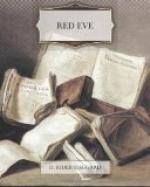CHAPTER XIX
THE DOOM
It was the last night of February, the bitterest night perhaps of all that sad winter, when at length Hugh de Cressi, Grey Dick, and David Day rode into the town of Dunwich. Only that morning they had landed at Yarmouth after a long, long journey whereof the perils and the horrors may be guessed but need not be written. France, through which they had passed, seemed to be but one vast grave over which the wail of those who still survived went up without cease to the cold, unpitying heavens.
Here in England the tale was still the same. Thus in the great seaport of Yarmouth scarcely enough people were left alive to inter the unshriven dead, nor of these would any stay to speak with them, fearing lest they had brought a fresh curse from overseas. Even the horses that they rode they took from a stable where they whinnied hungrily, none being there to feed them, leaving in their place a writing of the debt.
Betwixt Yarmouth and Dunwich they had travelled through smitten towns and villages, where a few wandered fearfully, distraught with sorrow or seeking food. In the streets the very dogs lay dead and in the fields they saw the carcasses of cattle dragged from the smokeless and deserted steadings and half hidden in a winding-sheet of snow. For the Black Plague spared neither man nor beast.
At the little port of Lowestoft they met a sullen sailorman who stood staring at the beach whereon his fishing boat lay overturned and awash for lack of hands to drag it out of reach of the angry sea. They asked him if he knew of how it fared with Dunwich.
By way of answer he cursed them, adding:
“Must I be forever pestered as to Dunwich? This is the third time of late that I have heard of Dunwich from wandering folk. Begone thither and gather tidings for yourselves, which I hope will please you as well as they do me.”
“Now, if I were not in haste I would stay a while to teach you manners, you foul-mouthed churl,” muttered Grey Dick between his teeth.
“Let the fellow be,” said Hugh wearily; “the men of Lowestoft have ever hated those of Dunwich, and it seems that a common woe does not soften hearts. Soon enough we shall learn the truth.”
“Ay, you’ll learn it soon enough,” shouted the brute after them. “Dunwich boats won’t steel Lowestoft herrings for many a year!”
So they rode on through Kessland, which they reached as night was closing in, through Benacre and Wrentham, also past houses in which none seemed to dwell.
“Murgh has been here before us, I think,” said Dick at length.
“Then I hope that we may overtake him,” answered Hugh with a smile, “for I need his tidings—or his rest. Oh! Dick, Dick,” he added, “I wonder has ever man borne a heavier burden for all this weary while? If I were sure, it would not be so bad, for when earthly hope is done we may turn to other comfort. But I’m not sure; Basil may have lied. The priest by the pit could only swear to the red cloak, of which there are many, though few be buried in them. And, Dick, there are worse things than that. Perchance Acour got her after all.”




